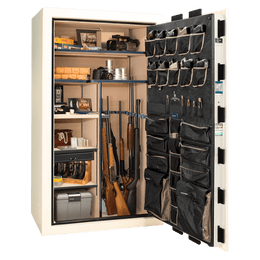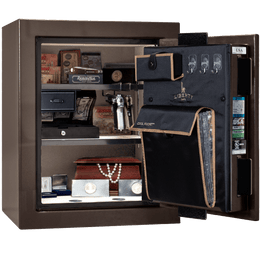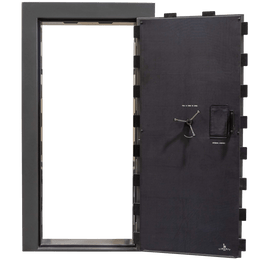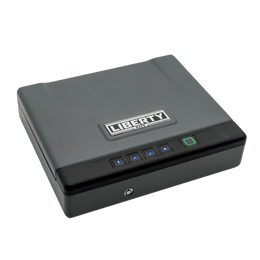Gun sales have reached their highest point in history over the past few years, and the number of first-time gun buyers is unprecedented. You may feel a little nervous or intimidated when buying or shopping for your first gun, but you don’t need to worry.
If you’re a first-time gun buyer, there are a few types of questions you must be asking (both to yourself and at a gun shop) to ensure you get the right gun for you and your unique situation. We will help you understand what types of questions you should ask to have the best possible experience when buying your first firearm.
Table of Contents
Don’t feel awkward or embarrassed for asking questions
No one should ever be embarrassed for asking questions, particularly about something potentially dangerous like a firearm. It’s good that you have questions and are asking about guns, so you can safely learn the basics and improve your knowledge base. Not everyone has been raised around firearms or has experience target shooting or hunting. If you have no experience with guns and/or are a first-time gun buyer, it’s awesome that you are interested in joining the shooting community and bringing up your questions.
Let the gun shop owner or salesperson know you’ve never bought a gun and would like extra help in being safe and choosing the right gun for you. Make sure to read the sections below so you can be prepared for a good experience.
First, always follow the four rules of firearm safety
Even if you don’t know anything about guns, you need to learn and follow these four rules at a minimum. If you always follow these rules, you’ll never accidentally hurt yourself or others with a gun:
- Treat all guns as if they’re loaded unless you personally, immediately, and visually verify otherwise. Another way to put this is to treat all guns as if they are always loaded.
- Never allow the muzzle/barrel of any gun to point at anything you are not willing to shoot and destroy. This includes your hands, legs, feet, other people, etc.
- Keep your finger off the trigger and outside the trigger guard (the part of the gun that goes around the trigger) until your sights are on the target and you are ready to shoot.
- Be sure of your target and what is behind it. For example, don’t shoot at a target on the crest of a hill, as you have no idea where that bullet will go.
Video: Four Rules of Firearms Safety
Rules two and three are the most important rules to remember inside a gun shop. Never point the gun, even unintentionally, at anyone else in the store or shop. At all times when you are holding the gun, be aware of where the barrel is pointing. Is it sideways? Who is potentially over there? Be very conscious of how and where you are pointing the gun. Yes, this applies even to empty guns.
And never, ever put your finger on the trigger, or pull it, without double-checking that the gun is unloaded and asking the salesperson if it’s okay for you to try the trigger or dry fire the gun. Some guns can be damaged by dry firing, and there’s always a chance (though a very small one) that someone along the line has left a gun loaded. Always ask before trying the trigger (more on this below).
Remember, these rules apply to everyone, including the person behind the counter at the gun shop. If any staff member is sloppy with muzzle control and points a gun (even an empty one) at you (or allows other customers to do the same), that’s a signal to you that they don’t take safety seriously. Get out of there immediately and find a better shop.
What questions should I ask at a gun shop or store?
Now let’s go over some specific questions you can ask to narrow your choices and help a gun shop provide you with the most appropriate recommendations for your situation.
Ask yourself, why do I want or need a gun?
The first question you need to ask, ideally before you even visit a gun shop, is what is your main purpose for buying a gun or, more simply, why do you want to buy a gun? This will help you narrow down the many reasons people may purchase firearms and help you and your friendly gun shop determine the types of guns you should consider. You may want a gun for only one purpose or one that fills several roles. Some common reasons for buying a gun include, but are not limited to:
- Home Defense
- Personal protection / concealed carry
- Bird hunting
- Small game hunting
- Big game hunting
- Long-range target shooting
- Handgun/close-range target shooting
- Clay target shooting
- Competition
- Nostalgia
- Family Activity
- Plinking (informal outdoor shooting for fun)
- Collecting/Investment
- To exercise your Constitutional rights
- You just want one (this is a perfectly valid reason)
Some firearms are designed and intended for only one specific role, while others can flex into multiple disciplines. If you have a clear idea of the reason/s you want to purchase a gun, the gun shop will be able to determine better the appropriate options for you to consider.
You may also be interested in our article detailing what we’d choose if we could only have one gun.
Determine how much you have to spend
Other than narrowing down the reasons you want a gun in the first place, the second major factor to consider is how much money you want to spend. If you have a maximum budget of $1,500, you will have a much wider array of options and potential recommendations than if you have a maximum budget of $350. If your budget limit is inflexible, make sure to let your friendly gun staff member know so he or she can help you find the best choices for you within your budget.
Don’t let a salesperson pressure you into spending more than you have budgeted. Suppose money is tight, and you must stick to your maximum spending limit for a home-defense firearm, for example. In that case, there’s absolutely nothing wrong with that, and there are likely several viable options within your spending range. They may not be the most glamorous or have the most features, but reliable firearms can be manufactured very inexpensively today. After consulting with the gun shop, you will decide whether to purchase a gun within your current budget or wait a few weeks and save for a better gun.
What are your top three recommendations for My Situation?
Rather than asking which gun you would recommend for home defense or what you should I get for concealed carry, try to ask the gun shop staff member to give a range of choices that can allow you the flexibility to find the one that works best for you. For instance, asking what their three most common recommendations for a squirrel rifle are, allows sales associates to show you several options to consider and demonstrate the pros and cons of each, rather than just pigeonhole them into recommending one gun.
The more specific you can be with your question, the more helpful the answer can be. For example, asking which semi-auto pistols they recommend for personal defense for someone with lower hand strength is a much more specific and helpful question than what gun should I buy.
How do I check to make sure this gun is unloaded?
This is a great question showing the staff member that you take safety seriously and are willing to learn. This question is much better than just asking if the gun is unloaded. Or worse, not asking at all. The assistant can show you how to remove any magazine, open the action, and visually and manually confirm that the firing chamber is empty and no ammunition in the gun. This is something that will need to become second nature to you if you purchase this gun, so it’s a good thing to ask at the counter. Remember to keep the muzzle pointed safely and your finger off the trigger. If it’s particularly difficult to confirm that a certain firearm model is unloaded, that can signal that it may not be the best choice for you.
Is it okay if I try the trigger (or can I dry fire this gun?)
As mentioned briefly above, you should never pull the trigger on any gun in a gun shop (in your home or anywhere) without double-checking the gun's condition. This means that the firearm is loaded and you’re on a shooting range wearing the appropriate safety gear or that you have verified that the gun is completely unloaded and pointing it in a safe direction for dry firing. Dry firing is the term for practicing the trigger without any ammunition in the gun.
Video: Why You Should Practice Dry Fire Shooting
Even if the above conditions are met, some firearms (typically older .22 caliber rifles and handguns) are not designed to be dry-fired, and doing so can damage them. So be sure to ask every time.
Note: Many gun shops today either have trigger locks on all their display counter firearms or may require you to point the muzzle into a countertop bullet trap before trying the trigger. This ensures that nobody fires an errant shot while evaluating a potential gun for sale. They may also place an inert snap cap into the chamber to prevent damage or wear to the firing pin. If you are seriously considering purchasing a firearm, don’t feel bad about asking the associate to remove the trigger lock and assist you in trying out the trigger. That’s their job, and buying a gun without trying the trigger is pretty silly.
What ammunition do you recommend for my gun, and is it hard to find?
If you’re just starting out, you might not realize that a particular gun comes in a relatively rare caliber, and your ammunition choices may be limited. For a concealed-carry gun, you need to be practicing pretty regularly. We recommend at least monthly to gain and maintain safe skills with your gun. You’ll also need a steady supply of ammo.
Furthermore, if you’re looking for a deer rifle and choose one chambered in an uncommon caliber, you might be out of luck if you’re expecting to find any boxes of .276 Nebraskan Ultrarare at your local Wal-Mart. Ammo availability is not the only consideration when selecting a firearm, but it is certainly something to consider.
Another thing to ask about is the cost of ammunition for a particular firearm. The difference in ammunition cost between two seemingly identical defensive revolvers can be a dealbreaker, particularly if you don’t reload. One might cost about $.20-$.50 a round, while another may cost $1.00-$3.00 per round if you can find any ammo.
What are some of the pros and cons of this particular Firearm?
Asking an employee more specific questions about the advantages and disadvantages of any gun does two important things: First, it potentially provides you with a broader understanding of all aspects of your potential purchase, including some things you may not have considered, and secondly, it may clue you in that a particular employee doesn’t really know what he’s talking about, so you can ask for someone else to help you. An honest and helpful counter staff member might respond that they haven’t had much personal experience with this particular brand and try to find someone to help you better. People like this deserve your business.
Can I purchase a (holster/case/accessory) for this gun here?
Some people enjoy shopping around, while others prefer a one-stop shopping experience. If you prefer to get all the needed accessories for your gun in one place, it can impact the firearm you select. If you want to buy your concealed carry handgun, red dot optic, CCW holster, and belt from your local shop, you’ll need to see if they can supply you with all of these items for any particular gun you choose. Sometimes they’ll have holsters and magazine pouches in stock for one handgun brand but not another, even though they sell the other firearm itself. It’s unreasonable to expect a local store to have every conceivable accessory for every conceivable firearm in stock at all times.
However, if you really like a particular gun but the shop doesn’t have your desired accessories in stock, most will be happy to order them.
Are any permits or waiting periods needed before I buy this gun?
Depending on where you live, there may be special permits you need to obtain before you’re even allowed to buy a gun (handguns in particular). Ask your gun shop what you need to do to purchase your gun legally, and they’ll often know the ins and outs of the local laws and ordinances better than most people and can often help you obtain any training required.
Where can I get additional training?
Many gun stores have their own indoor shooting range or are affiliated with a local range and can get you special pricing or memberships. If you are a first-time handgun buyer, particularly if you plan to carry concealed, getting professional training to help you stay safe and build your skills is a good idea. A good local shop will know how and where you can take classes or set you up with a range membership.
Additional recommendations for first-time gun buyers
It never hurts to do a little homework first to find out the best gun shops in your area. Smaller shops often give you more knowledgeable and personalized service than you will get in a big box store or huge sporting goods chain. If you have friends that own guns, ask them for gun store recommendations. You can also check online reviews to get an idea (but of course, take them with a grain of salt).
Remember, you don’t need to buy a gun in the first shop you visit. Take time to shop around to ensure you get the desired service. If you don’t like how you are treated at one gun store, just go somewhere else until you find the right one. If they say, they’re too busy or act like they don’t want to be bothered to help you, go somewhere else. A good shop won’t make you uncomfortable if you have questions. They will have no problem if you ask to check out a few different guns before deciding which one to buy. They want you to have a good experience and become a return customer.
It’s also a good idea to visit a gun range that rents different guns to try before you invest in your own firearm. Call your local ranges and ask if they offer rental guns.
Remember to reward good service with your business
Online gun sales are becoming very common today, and internet transfers may be a large part of your local gun store’s business model. In this sales model, your order and pay for a firearm from an online retailer, and they ship it to your local gun shop, which performs the transfer and background check (if needed) before you take possession of your gun. The local shop will charge a fee, usually between $20-$50, for this service since they’re not making any profit on the sale, and they have to handle all the paperwork, receive the shipment, keep the lights on, etc.
However, if you have taken advantage of the good service, friendly staff, and helpful advice of your local gun shop in deciding which firearm is right for you, try to reward them by buying the gun there rather than ordering it from an online retailer and having it transferred to you somewhere else.
Local brick-and-mortar retail shops (including gun stores) feel pressure from online mega-retailers and international big box chains. If you value personal service, quality, and convenience, put your money where your mouth is and spend a little extra to help keep your local gun shop in business. After all, they took the time to help you out and answer your questions.
If price is a big concern, you don’t need to feel obligated to buy your gun from a particular store, especially if local competitors have the same item for a significantly lower price. You might ask the manager if they can come closer to the lower price of their competitors so you can buy it from them. If they can’t match or approach the lower price, you might buy some ammunition, a holster, a rifle case, or something else you need from the gun shop that gave you such good service.
Keep your guns secure
Before buying your first gun, you must consider where to store it when it’s not in use. Most states don’t require you to lock your guns in a safe, but more and more states and cities are enacting safe storage laws that require you to keep your firearms and ammunition under lock and key, out of the reach of children and unauthorized users.
The best way to do this is with a quality US-made gun safe or handgun vault from Liberty Safe. Check out our online catalog, or visit one of the hundreds of Liberty Safe dealers across the US and Canada.
*Made in the U.S.A. from U.S. and Global Parts.







